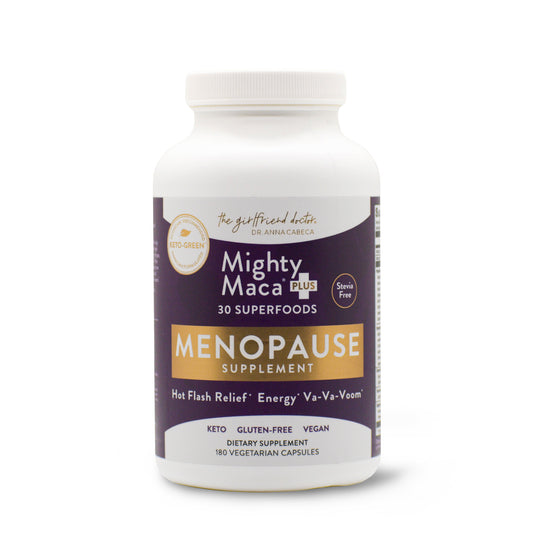You went to bed early. You skipped the wine. You turned off your phone and did all the right things for sleep hygiene—and yet, you still woke up this morning feeling like you’d run a marathon in your dreams.
Sound familiar? You’re not lazy, you’re not broken, and you’re definitely not alone.
As your Girlfriend Doctor, I hear this all the time:
“I’m sleeping—but I’m still exhausted.”
If you find yourself dragging through the day, hitting the snooze button, or struggling to find the energy you used to have, your body is trying to tell you something. Let’s get curious, not critical, and uncover what’s really going on—so you can reclaim your get-up-and-go.
In This Article, You’ll Learn:
Why sleep alone isn’t enough if your hormones are out of sync
The 5 most common causes of lingering fatigue
How stress, menopause, and lifestyle play a role
Natural ways to reset your energy from the inside out
My favorite tools, daily habits, and clinical pearls for feeling vibrant again
FAQs on fatigue, hormones, and when to seek help
Why You’re Still Tired After 8 Hours
Sleep is essential. But if you’re clocking 7-9 hours and still waking up tired, it’s time to look deeper.

Your adrenal glands are your body’s “stress managers.” When you’re under chronic stress—or even just juggling too many responsibilities—your cortisol rhythm can go haywire. You may feel “wired and tired,” wake up groggy, or hit a wall mid-afternoon.
Chronic stress can lead to a cortisol crash overnight, leaving you depleted in the morning—even if you technically “slept.”

Do you ever wake up at 3 a.m., heart pounding, or feel super sluggish first thing in the morning? Even minor swings in nighttime blood sugar can disrupt deep sleep and leave you drained the next day. A dinner heavy in carbs, sugar, or alcohol is a common culprit.

Your thyroid is the “master regulator” of metabolism, mood, and energy. After 40 (and especially in perimenopause/menopause), low thyroid function is increasingly common. If you’re tired, cold, constipated, or struggling with weight, your thyroid is worth checking.

These sleep-stabilizing hormones begin to drop in perimenopause and continue to decline through menopause. Lower progesterone can make it harder to relax or stay asleep; lower estrogen can cause night sweats, hot flashes, or mood swings that disrupt your sleep cycle.

While you sleep, your liver is hard at work clearing toxins, excess hormones, and metabolic waste. If your liver is overburdened (from processed foods, alcohol, medications, or environmental toxins), you may not clear waste efficiently—leaving you groggy and foggy in the morning.
“Fatigue is one of the first whispers your body uses to get your attention. Listen to it—and support it.” — Dr. Anna
Other Hidden Causes of Fatigue
Sleep Apnea and Airway Issues
Especially common after 40, undiagnosed sleep apnea or upper airway resistance can rob you of deep sleep without you even realizing it. If you snore, wake up with a dry mouth or headache, or never wake up refreshed—talk to your doctor about a sleep study.
Iron and B12 Deficiency
Low iron (especially after heavy periods or as a result of digestive issues) and low B12 can cause profound fatigue, even if you’re sleeping well.
Inflammation and Chronic Illness
Autoimmune conditions, low-grade infections, or chronic inflammation can all sap your energy.
Poor Sleep Hygiene
Late-night screens, caffeine, or stress can all disrupt the sleep hormones melatonin and cortisol—even if you’re “in bed” for 8 hours.
How to Naturally Reclaim Your Energy
Ready to feel like yourself again? Here are my go-to strategies:
1 | Start with Adaptogenic Support
My favorite all-in-one adaptogen is Mighty Maca® Plus. It’s my daily go-to for hormone harmony, adrenal balance, and anti-inflammatory support. Maca root, greens, turmeric, and more combine to nourish your body’s stress response and boost natural energy—without jitters or sleep disruption.
2 | Stabilize Blood Sugar
What you eat at night matters. Aim for a Keto-Green® style dinner: low in sugar, high in fiber, healthy fats, and moderate protein. This prevents blood sugar crashes or spikes that can jolt you awake or leave you drained in the morning.
Try a Keto-Green® Shake earlier in the day for steady energy.
3 | Prioritize Sleep Hygiene
Don’t underestimate the basics:
Power down screens by 9 p.m. (or wear blue light blocking glasses)
Keep your bedroom cool, quiet, and dark
Use blackout curtains and avoid night lights
Try magnesium glycinate or calming herbal teas
Practice breathwork or gratitude journaling before bed
4 | Check In On Your Thyroid
Don’t settle for “normal” TSH. Ask your provider to test TSH, free T3, and free T4 —not just TSH. If your levels are borderline or you have symptoms, advocate for deeper investigation.
5 | Support Liver Detox Pathways
Your liver is a detox hero—give it love!
Eat cruciferous veggies (broccoli, cauliflower, kale, cabbage)
Drink clean, filtered water
Try OncoPLEX™ with sulforaphane, a broccoli sprout extract for gentle detox
Limit processed foods and alcohol
Use lemon water or herbal teas (like dandelion or milk thistle)
6 | Move Your Body—Even a Little
Gentle daily movement (walking, stretching, yoga) improves circulation, lymphatic flow, and mental clarity. You don’t need to run a marathon—a brisk 20-minute walk can do wonders.
7 | Honor Your Mind-Body Connection
Chronic stress, grief, or anxiety can leave your “energy battery” perpetually low. Mindfulness, prayer, therapy, or even just 5 minutes of deep breathing can help reset your nervous system.

My Personal Story: When Sleep Wasn’t Enough
I’ve been there, too. There was a time in my 40s when I’d wake up exhausted, no matter how early I went to bed. As a doctor and a mom, I felt like I was failing at everything. It wasn’t until I dug deeper—looking at my hormones, my thyroid, and my stress levels—that I realized my body was waving a red flag.
I added adaptogens, focused on blood sugar balance, and made self-care non-negotiable. It took time, but my energy came back. And it can for you, too.

My Personal Story: When Sleep Wasn’t Enough
I’ve been there, too. There was a time in my 40s when I’d wake up exhausted, no matter how early I went to bed. As a doctor and a mom, I felt like I was failing at everything. It wasn’t until I dug deeper—looking at my hormones, my thyroid, and my stress levels—that I realized my body was waving a red flag.
I added adaptogens, focused on blood sugar balance, and made self-care non-negotiable. It took time, but my energy came back. And it can for you, too.
The Role of Hormone Imbalance in Fatigue
Let’s talk about hormones.
Cortisol should be highest in the morning and lowest at night. Chronic stress, late-night work, or unresolved trauma can flip this pattern, leaving you “wired and tired.”
Progesterone is calming and helps you fall—and stay—asleep. It’s one of the first hormones to drop in perimenopause.
Estrogen supports serotonin and melatonin production, which keep your mood, sleep, and energy stable.
Thyroid hormones control metabolism—the body’s “energy currency.”
If even one of these is out of sync, you’ll feel it. And if you’re in your 40s or 50s, it’s likely more than one is shifting.
Why “Getting Older” Isn’t the Answer
Yes, your body changes with age—but persistent fatigue is NOT inevitable.
Fatigue is a symptom, not a diagnosis. It’s your body’s way of asking for support, not a sign you’re lazy or “just getting old.”
If you’re still tired after 8 hours of sleep, you deserve a deeper look—and a plan to feel better.
When to Seek Professional Help
If the following symptoms persist, reach out to your trusted provider:
Extreme fatigue, no matter how much you rest
Unintentional weight changes
Hair loss, dry skin, or brittle nails
Brain fog or memory problems
Heavy periods or missed cycles
Mood changes, anxiety, or depression
Snoring, gasping, or choking at night
A comprehensive workup—including labs, sleep study, and a deep dive into your history—can make all the difference.
Your Next Energy Boost Starts Here
You don’t have to push through. You deserve to feel rested, focused, and fully alive.
💚 Try Mighty Maca® Plus for daily hormone and adrenal support
🥗 Get the 16-Day Keto-Green® Meal Plan to reset your system
🔍 Take the Quiz to Find Your Root Cause
And remember:
Listen to your body’s whispers before they become shouts.
Advocate for yourself—don’t accept “normal labs” if you still feel off.
Celebrate every small win. Healing is a journey, not a sprint.
FAQs: Energy, Hormones, and Fatigue After 40
Q: What if I’m already eating well and still tired?
A: Your body may need more targeted support—like adaptogens, probiotics, or a better bedtime routine. Sometimes, even healthy eaters need to look at hormones, thyroid, or sleep quality for the full answer.
Q: Can I take Mighty Maca at night?
A: Yes. It’s energizing without being stimulating, so it won’t disrupt sleep. Many women find it helps balance energy throughout the day and supports restorative sleep at night.
Q: Is this just “getting older”?
A: No! Fatigue is common, but not normal. You can feel energized again—with the right tools and support.
Q: What labs should I ask for?
A: In addition to basic labs, request TSH, free T3, free T4, iron studies, B12, fasting glucose, and hormone panels (especially if you’re perimenopausal or menopausal).
Q: How do I know if it’s my hormones or something else?
A: Keep a symptom diary for two weeks. Track your sleep, food, mood, and cycle. Patterns will often emerge, and your provider can help connect the dots.
Q: Why am I still tired after 8 hours of sleep?
A: Hormone imbalance, thyroid issues, stress, blood sugar swings, and poor detoxification can all play a part. Sleep is just one piece of the energy puzzle.
Q: What’s the best first step to boost my energy naturally?
A: Support your hormones with adaptogens (like Mighty Maca® Plus), eat to stabilize blood sugar, and prioritize sleep hygiene.
Q: Is fatigue just part of aging?
A: No, and you deserve better. Fatigue is a sign your body needs support—not a life sentence.
Q: What if I’m doing everything right and still feel exhausted?
A: Ask your provider for a deeper look at your hormones, thyroid, iron, and gut health. Sometimes the root is hidden, but it’s always worth finding.
Ready to reclaim your energy? Start with one of my favorite tips above—or take the quiz to find your root cause and the best next step for you.









